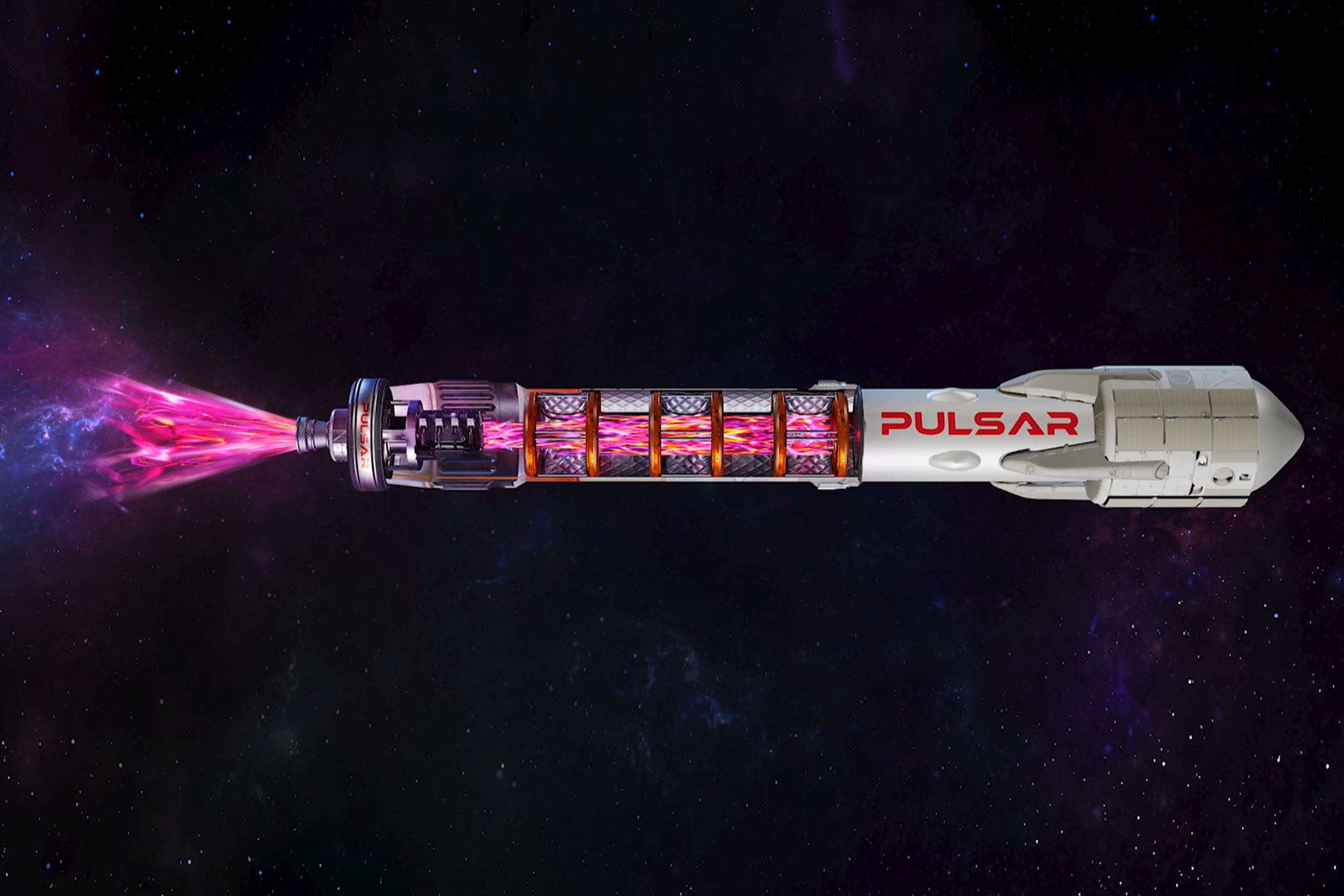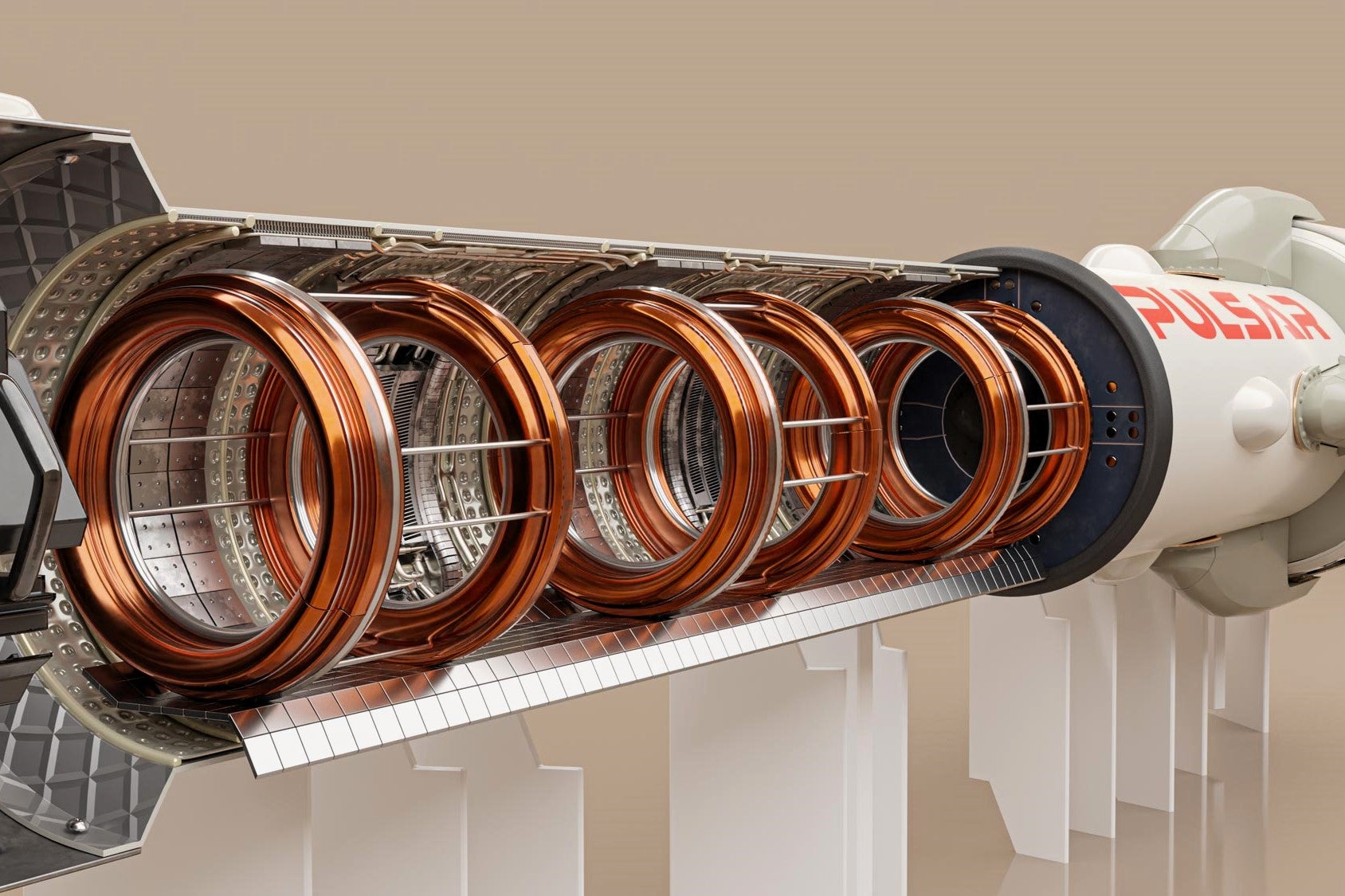How nuclear fusion rockets could launch a new era of super-fast space travel
A team of British scientists has been working on a breakthrough that would cut journey times to Mars from months to weeks, writes Anthony Cuthbertson


Sandwiched between a print shop and an auto parts store on an industrial estate in Bletchley, a group of engineers are constructing a rocket engine that will run hotter than the Sun. If successful, it could cut journey times to Mars from months to weeks, and herald a new era of interstellar space travel.
After more than a decade of development the core technology still remains untested, but UK startup Puslar Fusion claims to be on the cusp of creating the world’s first practical nuclear fusion rocket engine.
Harnessing the potential of nuclear fusion has puzzled scientists since the 1950s, though most of the focus has been towards figuring out how to use it to generate electricity. The process involves mimicking the same natural reactions that occur within the Sun in order to produce near-limitless energy, offering what some have described as the “holy grail” of clean energy.
Last year, researchers at the Lawrence Livermore National Laboratory in California achieved a net energy gain in nuclear fusion for the first time, using lasers to fuse two light atoms into a single one in order to release more energy than was input. Physicist Arthur Turrell described it as a “moment in history”, claiming that controlling the power source of the stars is “the greatest technological challenge humanity has ever undertaken”.
The feat, known as ignition, marked a major milestone towards making it a viable energy source, and reignited interest in the field. But scaling up the technology from laboratory experiments to building a commercial nuclear fusion power station remains a long way off.
What may come first, according to Pulsar Fusion, is a nuclear fusion rocket, capable of blasting people and cargo around the Solar System and beyond. The favourable conditions of space – it offers a near-perfect vacuum and extremely cold temperatures – means the difficult process of containing super-hot plasma within an electromagnetic field could be much easier than on Earth.
“Looking at the new small reactor designs being developed here in the UK, it is conceivable that these could be used to power space travel,” Karl Whittle, a professor of zero carbon and nuclear energy materials at the University of Liverpool, told The Independent. “Such a power source could enable an expansion in exploration within the solar system, with the potential to extract resources from bodies such as asteroids.”
The booming space industry, propelled by renewed interest from government agencies and the emergence of private firms like SpaceX and Blue Origin, means there has been significant investment and research into nuclear fusion rockets in recent years.
“Humanity has a huge need for faster propulsion in our growing space economy, and fusion offers 1,000 times the power of the conventional ion thrusters currently used in orbit,” Pulsar Fusion founder Richard Dinan said in July after announcing that his firm had finally begun construction of an eight-metre chamber that will he hopes will form the engine for the first nuclear fusion rocket ever built.
“In short, if humans can achieve fusion for energy, then fusion propulsion in space is inevitable. We believe that fusion propulsion will be demonstrated in space decades before we can harness fusion for energy on Earth.”

The theoretical top speed of such a rocket is around half a million miles per hour (800,000kph), which would allow spacecraft to reach Mars in under 30 days. Current rocket propulsion technology takes seven months to make the same journey, exposing astronauts to harmful health risks like space radiation and extended periods of microgravity.
Pulsar Fusion has already secured funding from the UK Space Agency and the UK government to develop its nuclear fusion propulsion system, while also having revenue streams from existing products that it has developed.
The company claims it will be profitable by 2025 through the manufacturing of technologies like hall-effect thrusters, which are mainly used to manoeuvre Earth-orbiting satellites but can also serve deep-space robotic vehicles.
The startup also recently announced research partnerships with the University of Michigan and Princeton Satellite Systems, an aerospace company, and announced plans to begin static fire tests of its direct fusion drive nuclear fusion rocket engine next year. An in orbit demonstration could then follow as early as 2027. The self-sustaining fuel supply could theoretically provide both the thrust for a spacecraft and the onboard electricity.
“Nasa is interested in a variety of deep space destinations such as getting to Jupiter in one year, Saturn in two years, Pluto in four to five years,” said Stephanie Thomas, vice president of Princeton Satellite Systems. “A single, one-megawatt direct fusion drive engine can handle any of those missions.”

It is a massive task, and one that has proved too daunting for the current leaders within the private space industry. Elon Musk describes nuclear fusion rocket engines as a “great idea”, but SpaceX has no plans to develop the technology, at least not publicly.
Other companies and research institutions working on nuclear fusion recognise the potential of using the technology for space propulsion but are more focused on realising its potential as a terrestrial power source rather than an intergalactic fuel.
“There are three main challenges for building a nuclear fusion rocket. The first difficulty is general to fusion, which is getting a very high net energy gain,” Dennis Whyte, a professor of nuclear science and director of the Plasma Science and Fusion Centre at the Massachusetts Institute of Technology (MIT), told The Independent.
“The second obstacle is a special difficulty of propulsion. Particles that result from fusion have very high velocities, so using fusion fuel particles in such a system and releasing them out the back of the rocket could result in the loss of unburned fuel. The third challenge relates to achieving the correct power-to-mass ratio, which is the key metric when it comes to the efficiency of a rocket.”
Despite these challenges, nuclear fusion is currently the only technology that we know of that could allow humans to leave our solar system this century. The location of Pulsar Fusion’s headquarters – it is just 200 metres from a Primark clothing store – may seem like an inauspicious setting to achieve such an ambitious endeavour, but it would not be the first time that Bletchley has seen implausible feats pulled off that change the course of human history.
Join our commenting forum
Join thought-provoking conversations, follow other Independent readers and see their replies
Comments


Bookmark popover
Removed from bookmarks